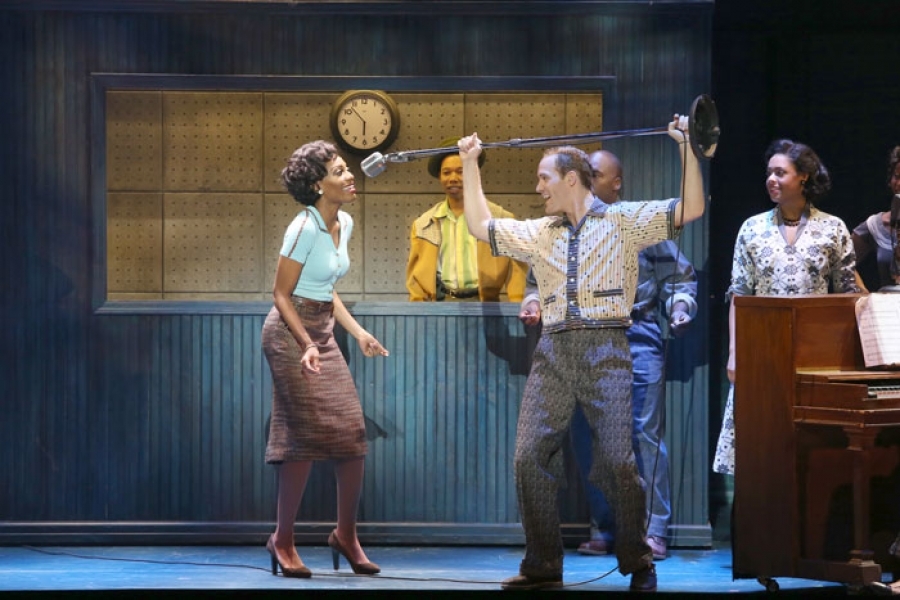The word “magic” often gets thrown around in the theatre world, and rightfully so. When the right script and talent come together in the right time and place to positively transfix the right audience, there’s no doubt an extraordinary amount of work; but there’s also an indescribable element of magic. And when all those conditions collide at once it is a rare event indeed.
Memphis: the Musical, the 15th anniversary season opener at Mason Street Warehouse in Saugatuck, possesses the kind of magic that’s possible but so very rare in theatre. It’s not just a great show; it’s a transcendent experience.
This 2010 Tony-Award winning musical is huge. And under Kurt Stamm’s direction, with an extraordinarily talented cast and crew, it’s also beautifully nuanced.
Memphis comes from Joe DiPietro and David Bryan, and is so lively, soulful, and well-written, it’s hard to believe it’s the same team that created the goofy, flawed Toxic Avenger. Set in 1951 Memphis, the musical is loosely based on the story of Dewey Phillips, one of the first white DJs to bring black music to white radio audiences, a turning point in American music and perhaps race relations in this country. His on-air persona was the kind of character that can only come from the south — a kind of comic, quirky, jagged-up hillbilly.
In the show, he’s a weird white boy who wanders into an underground Beale Street juke joint and doesn’t seem to understand why he might be out of place in the all-black club, where what he deems the “music of my soul” comes alive. His love of the blues coupled with an utter disregard for race and the obstacles of mid-century deep south racism lead him to a wildly successful career in radio and television, as well as a tragic interracial relationship that have an enormous personal and cultural impact, which comes with both implicit and explicit violence.
And that’s what this musical is really about. Though the narrative is largely organized around the character of Huey, it’s about so much more than him; and the spotlight in the Mason Street Warehouse production lands squarely where it should: on the people of color in whose lives he made waves (for better and for worse), and the white folks whose deeply rooted racism he challenged.
But even more important than the plot and the sequence of events in time unfolding on stage is what all the elements of this production evoke. The juxtaposition of white and black spaces, the differing styles of song and dance between the segregated races, and the building and shifting of characters and their relationships through those spaces and music and movements — it all transports the audience to perhaps feel something they’ve never felt, or maybe in a new way: real empathy. At the end of Act I, for example, there was hardly a dry eye in the house opening night.
Pretty powerful magic.
And it emerges from terrific casting and performances, bold choreography full of dramatic lifts, backbends, dips, and backflips with more subtle motifs throughout from Kurt Stamm; Jamie Reed’s tremendous musical direction; Darlene Veenstra’s gorgeous shimmering period costumes based on Paul Tazewell’s original production designs; and Jennifer Kules’s lighting with Jeremy Barnett’s sets, which come together to create shifts in time and space beautifully. Everything in this production moves magnificent: dancers, costumes, music, language, narrative and character arcs, relationships, lights and sets. As a result, there is never a lull, and the audience is wrapt.
Of course this is thanks in no small part to virtuoso performances, especially from leads David R. Gordon as a wonderfully quirky Huey and Lindsay Roberts as a both sweet and strong Felicia Farrell who positively glows. Soulful singers each in their own right, together they are electric. Garrett Turner is a powerful force as club owner and big brother Delray Farrell; Jeremy Abram’s Gator is captivating and complex; Joe Somodi provides fun comic relief as the mostly clueless Mr. Simmons; and Jane Blass’s Gladys Calhoun is a show stopper. Really, every one of the cast of 19 is stellar and deserves the standing ovation they’ll undoubtedly receive every night of this run.
Clearly, everyone involved in this production contributes to the magic they collectively create. Or, put more simply, as I overheard one patron opening night say: “It’s a whole lot of show for the ticket.”
Memphis: the Musical
Mason Street Warehouse at Saugatuck Center for the Arts
400 Culver St., Saugatuck
June 23-July 9, $38-$46
masonstreetwarehouse.org,
sc4a.org, (269) 857-2399





